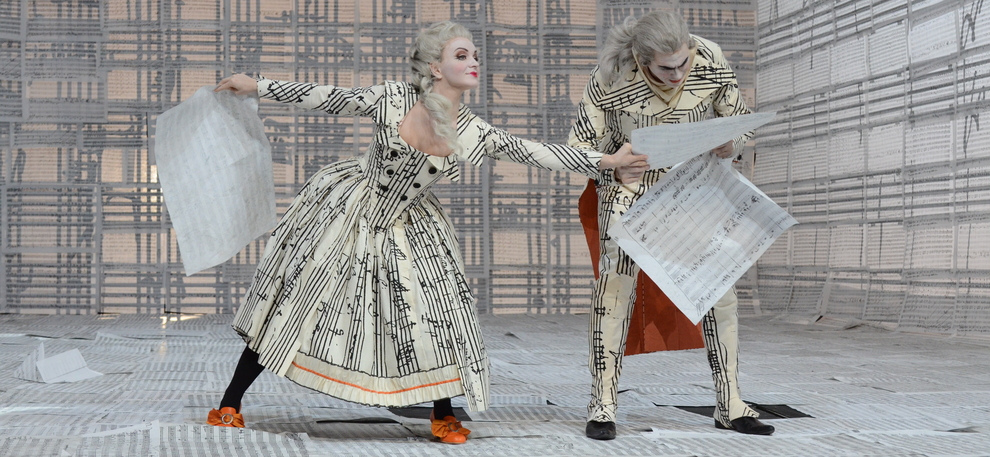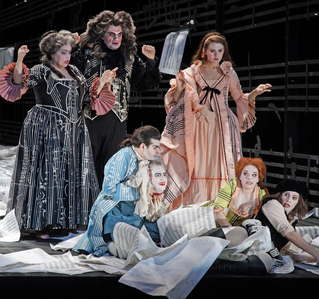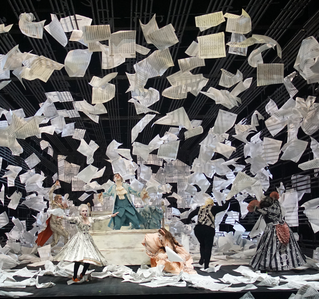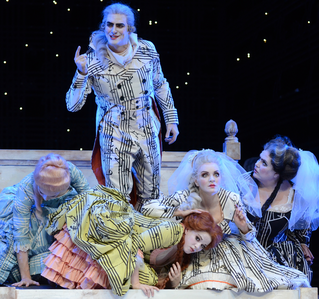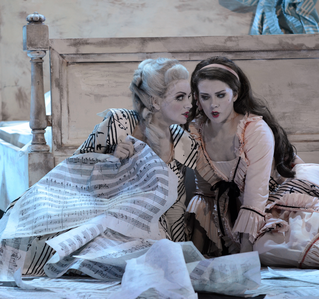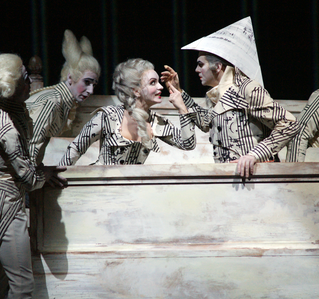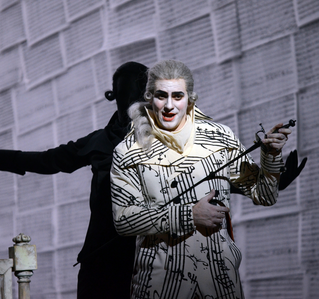Fr 27.06.2025, 19.00 - 22.30 Uhr | Großes Haus
Wolfgang Amadeus Mozart
Le Nozze di Figaro
Einführung um 18.20 Uhr
In historischen Umbruchzeiten erfüllt euphorischer Jubel die Sieger, während auf Seiten der Verlierer sich die Angst breit macht. Wenn sich in Mozarts Stück Heiterkeit Bahn bricht, ist sie der schadenfreudige Abgesang auf absterbende Strukturen, alte Privilegien, überkommene Verfahrensweisen – auch der zwischen Mann und Frau. Mozart (und Beaumarchais) halten auf der Schwelle der Zeit die Balance – als Künstler auf dem Weg zur eigenen Selbstvermarktung, inhaltlich in der präzisen Zeichnung einer gewichtsverlagerten Gesellschaft mit Almaviva als lächerlicher Figur. Seine Klasse verliert politische Macht, und als Sklave seiner sexuellen Leidenschaft kompensiert er deren Verlust. Der Wind weht aus der Vergangenheit, dem Engel der Geschichte Walter Benjamins bläht er die Flügel. Er ist ein Sturm für die Sieger, für die Verlierer ein melancholischer Windstreif. Der Engel sieht nur Trümmer.
Inszenierung: Stefan Herheim
Bühnenbild: Christof Hetzer
Kostüme: Gesine Völlm
Licht: Phoenix (Andreas Hofer)
Video: fettFilm
Dramaturgie: Alexander Meier-Dörzenbach
Premiere am 15.11.2015
Eine Pause von ca. 25 Minuten nach dem zweiten Akt (nach ca. 110 Minuten)
Altersempfehlung: ab 14 Jahren/Klasse 9
In italienischer Sprache mit deutschen und englischen Übertiteln
Unterstützt durch die Stiftung zur Förderung der Hamburgischen Staatsoper
Die Oper spielt im und um das Landschloss Aguas Frescas des Grafen Almaviva außerhalb von Sevilla um 1780.
1. Akt
Figaro, der Kammerdiener des Grafen Almaviva, will an diesem Tag Susanna, die Kammerzofe der Gräfin, heiraten. Ihnen wurde das Zimmer zwischen den gräflichen Gemächern zugewiesen, in welchem Figaro die Einrichtung des Ehebetts vorbereitet. Susanna versteht sofort, was hinter dieser Raumzuweisung steckt und klärt Figaro über das erotische Interesse des Grafen an ihr auf: Trotz seines Verzichts auf das Herrenrecht, die erste Nacht mit den Bräuten seines Lehns zu verbringen, hat der Graf bereits einiges heimlich veranlasst, um sich Susanna gefügig zu machen. Figaro plant, den Grafen zu überlisten.
Für ein Darlehen bei der Haushälterin des Doktor Bartolo, Figaros ehemaligem Arbeitsgeber, hat Figaro seinen Körper als Hypothek eingesetzt: Wenn er Marcellina die Summe nicht zurückzahlt, muss er sie laut Schuldschein heiraten. Bartolo hilft Marcellina allzu gerne zu dieser Ehe, denn er will sich an Figaro rächen, der einst sein Mündel Rosina – die heutige Gräfin Almaviva – dem Grafen hinterlistig zugespielt hat. Als Marcellina Susanna begegnet, provoziert sie ihre Rivalin und gerät in Zank mit ihr über weibliche Ehrbarkeit.
Der junge Page Cherubino wurde bei einer Liebelei mit der Gärtnerstochter Barbarina vom Grafen erwischt. Er soll des Hofes verwiesen werden und bittet nun Susanna um Fürsprache bei der Gräfin, die er genau so begehrt wie Susanna und alle Frauen der Welt. Als der Graf naht, versteckt sich Cherubino. Der Graf beteuert Susanna seine Liebe, verbirgt sich dann aber ebenfalls, weil der intrigante Musiklehrer Basilio aufkreuzt. Dieser will Susanna die Freude an mehreren Liebhabern schmackhaft machen, warnt sie jedoch, nicht so dreist vorzugehen wie der Page, der es eindeutig auf die Gräfin abgesehen habe. Empört tritt der Graf hervor und befiehlt Basilio, den Pagen zu suchen, findet ihn aber flugs selbst in seinem Versteck. Er wirft Susanna doppeltes Spiel vor; sie widerspricht und stellt klar, dass der Page alles mitgehört hat, was der Graf ihr gesagt hat.
Um die Hochzeit mit Susanna voranzutreiben, führt Figaro Landleute herein, die er den Grafen als vermeintlichen Schützer der Unschuld lobpreisen lässt. Unter dem Vorwand, das Hochzeitsfest angemessen vorbereiten zu lassen, bittet der Graf jedoch um Aufschub und befiehlt Cherubino, sofort zum Offiziersdienst nach Sevilla aufzubrechen. Entsprechend hinter sinnig verabschiedet Figaro den Pagen.
2. Akt
Gräfin Almaviva ist betrübt ob der Untreue ihres Gemahls, von der ihr Susanna berichtet, und lässt sich auf den Plan Figaros ein: Die Eifersucht des Grafen soll geschürt werden, indem diesem ein anonymer Brief zugespielt wird mit dem Hinweis, dass seine Gattin einen Liebhaber habe. Zugleich soll sich Susanna zu einem Stelldichein mit dem Grafen verabreden, zu dem aber an ihrer Stelle Cherubino als Mädchen maskiert erscheinen soll. Figaro hat den Pagen nicht nach Sevilla abreisen lassen und schickt ihn zu den Damen. Cherubino, der zur Travestie bereit ist, singt der geliebten Gräfin ein Lied vor und lässt sich herzlich gerne von den Damen verkleiden.
Der Graf findet die Tür der Gräfin verschlossen. Bevor sie ihm öffnet, kann der Page sich im Kabinett verstecken, stößt dabei gleichwohl etwas um, wodurch der Graf den Liebhaber der Gräfin eben dort vermutet. Sie behauptet, es wäre Susanna, weigert sich aber, den Schrank zu öffnen und befiehlt ihrer Zofe durch die verschlossene Tür, weder heraus zu kommen noch ein Wort zu sagen. Tatsächlich hinter dem Bett versteckt, erlebt Susanna, wie der Graf seine Frau beschimpft und verleumdet. Um keinen Skandal zu machen, bevor ihre Untreue bewiesen ist, will der Graf selbst das Nötige holen, um die Tür aufzubrechen. Er bittet seine Gattin, ihn zu begleiten und schließt alle Türen zum Raum ab. Während sie weg sind, springt Cherubino vom Balkon in den Garten hinunter und Susanna schließt sich selbst ins Kabinett ein. Der Graf kommt mit der Gräfin zurück. Als er droht, ihren Liebhaber umzubringen, erzählt sie ihm vom Plan Figaros; sie gesteht, dass Cherubino im Kabinett sei und gibt ihre Unschuld beteuernd dem Grafen den passenden Schlüssel. Wütend will er den Pagen töten, doch da tritt Susanna aus dem Kabinett. Die Gräfin ist ebenso überrascht wie der Graf, tut dennoch so, als hätte sie mit Susanna alles geplant, um den Gatten zu prüfen. Der Graf wirft ihnen Grausamkeit vor, entschuldigt sich jedoch und will Frieden schließen.
Da platzt Figaro herein, der nicht weiß, was vorgefallen ist und daher nichts zugeben will. Die Situation spitzt sich zu, als der Gärtner Antonio dazukommt und vom Sprung eines Mannes vom Balkon in den Garten erzählt. Figaro behauptet nun, er wäre selbst gesprungen und als Antonio das Blatt vorholt, dass er unter dem Balkon fand, will der Graf von Figaro genau wissen, was er im Sprung wohl verloren habe. Die Frauen erkennen das Offiziers patent Cherubinos und geben Figaro heimliche Zeichen, der somit dem Grafen Rede steht, ihm aber nicht die Zweifel an Cherubinos Abreise nach Sevilla nehmen kann. Als schließlich auch Marcellina, Bartolo und Basilio reinplatzen, um ihre Forderung gegen Figaro gerichtlich geltend zu machen, scheint jede Ordnung aufgehoben.
3. Akt
Weitere Pläne werden für und gegen die Hochzeit des Figaro ausgeheckt. Dem Grafen verspricht Susanna, zum abendlichen Stelldichein in den Garten zu kommen, zu dem nunmehr die Gräfin selbst als Susanna verkleidet erscheinen will. Der Graf hört aber, wie Susanna Figaro über diese Falle aufklärt. Er schwört Rache und will den ausstehenden Richterspruch von Don Curzio in Marcellinas Angelegenheit nutzen. Die Gräfin gibt Susanna das Geld, mit dem sie Figaro freikaufen kann, jedoch nicht ohne preiszugeben, wie schmachvoll sie den Kampf um die Liebe ihres Mannes empfindet.
Bei der Gerichtsverhandlung stellt sich heraus, dass Marcellina und Bartolo tatsächlich die Eltern Figaros sind. Die beiden haben nun gegen Figaros Hochzeit mit Susanna nichts mehr einzuwenden und beschließen sogar, Doppelhochzeit zu feiern. Der Graf tobt innerlich und sucht weitere Mittel, um die Hochzeit aufzuhalten.
Die Gräfin will an ihrem Plan festhalten; sie diktiert Susanna diesmal eine schriftliche Einladung an den Grafen und besiegelt das Briefchen mit einer Nadel, die als Zeichen des Einverständnisses zurückgegeben werden soll. Barbarina bringt zusammen mit einigen Mädchen und dem verkleideten Cherubino der Gräfin Blumen. Der Graf platzt mit Antonio herein, erkennt den Pagen und will ihn für seinen Ungehorsam bestrafen, doch weiß Barbarina ihn zu schützen, indem sie den Grafen bittet, ihr einen Wunsch zu erfüllen, den er ihr für ihre ständige Verfügbarkeit versprochen hat; sie fordert Cherubino zum Manne. Alle Versuche des Grafen, die Damen am Hofe für sich zu beanspruchen sind gescheitert und er kann die Hochzeit des Figaro nicht mehr aufhalten. Während der Zeremonie steckt Susanna dem Grafen das Briefchen heimlich zu. In Vorfreude auf das Stelldichein mit der Braut lädt der Graf alle großzügig zum Fest ein.
4. Akt
Barbarina hat die Nadel verloren, die sie im Auftrag des Grafen als Zeichen seiner Zusage Susanna zurückbringen sollte. Figaro gibt ihr eine andere und erfährt so von der vermeintlichen Untreue seiner Braut. Sich am Hochzeitstag von Susanna hintergangen glaubend will er sie nun ausspähen. Im Garten beschwört Susanna den Zauber der Liebe herauf und tauscht ihre Kleider mit der Gräfin. Als Susanna verkleidet, wird die Gräfin zunächst von Cherubino bedrängt. Der Graf verjagt ihn, um selbst der vermeintlichen Susanna brünstig aufzuwarten – alles unter der Aufsicht Figaros, dem sich daraufhin die mutmaßliche Gräfin nähert. An der Stimme erkennt jedoch Figaro seine verkleidete Frau sowie ihre Absicht, ihn als Strafe für seinen Verdacht hereinzulegen. Er macht ihr als Gräfin Avancen; nun glaubt Susanna sich betrogen und schlägt auf ihn ein bis Figaro sie über das doppelte Täuschungsspiel aufklärt. Sie schließen Frieden und setzen ihr Liebestreiben vor dem Grafen fort, der wütend die ganze Gesellschaft herbeiruft. Trotz gemeinschaftlichen Flehens will er keine Gnade gewähren lassen und erkennt sein Unrecht erst, als seine Gemahlin ihre Verkleidung fallen lässt. Er bittet um Verzeihung. Sie wird ihm gewährt. Abschließend eilt jeder, den tollen Tag zu feiern, der für alle zur Nacht wurde.

